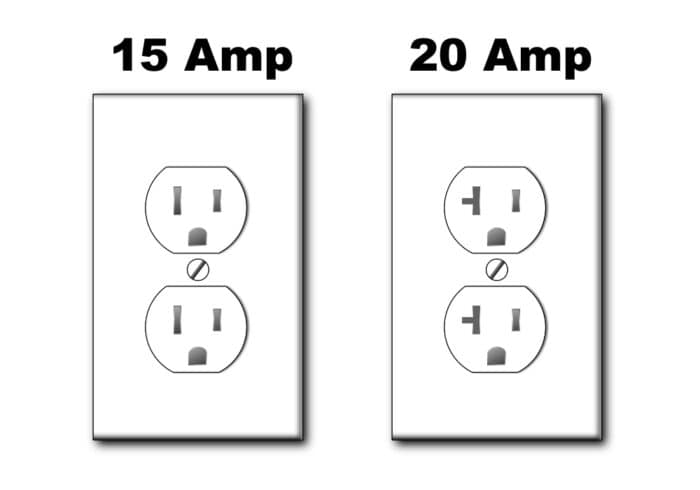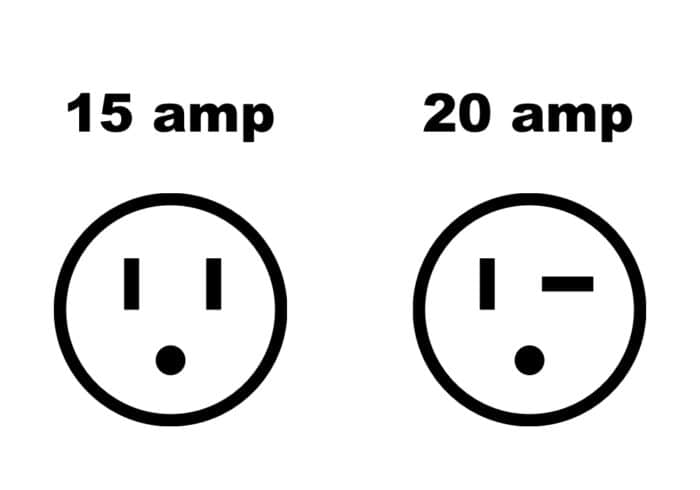Difference Between 30A/50A RV Park Outlets and House Outlets
Yes, you can plug your RV or camper trailer into a garage or home outlet. But there are a few things to know first.
First, the electrical output is a lot different. 50 amp RV outlets can output up to 12,000 watts, 30 amp up to 3,600 watts.
Related Product: Plug your RV into a 20 amp outlet in the wild using the EF EcoFlow Delta Max (click to view on Amazon)
Home outlets are usually rated for 15 or 20 amps. A 15 amp outlet can output up to 1,800 watts and a 20 amp up to 2,400.
House outlets aren’t going to supply nearly as much power as a 30 or 50 amp RV can draw.
Because of this, you are going to have to make sure you limit the electronics you use in your RV.
Note that many of these adapters also work when plugging an RV into a generator with a 15 amp or 20 amp outlet.
See Also: The Surprising Differences Between 30A & 50A RVs
How To Plug An RV Into A House Outlet
15 or 20 Amp RV
Some very small campers only use 15 to 20 amps. If it’s a 15 amp you will be able to plug it into any of the outlets in your home or garage.
If it’s a 20 amp RV you will need to find a 20 amp outlet since the plug will not fit into a 15 amp.

Large kitchen appliances and power tools are the most common household items that use 20 amp plugs.
That means you can sometimes find 20 amp outlets in kitchens and garages.
If you have a 20 amp outlet in your garage you will want to plug into that one since it will give you the most power.
A 15 amp plug can be plugged into a 20 amp outlet but a 20 amp plug cannot be plugged into a 15 amp outlet without an adaptor.

So there’s no risk of you plugging a 20 amp RV into a 15 amp outlet without knowing it.
If you plug a 15 amp plug into a 20 amp the plug will still only be able to take 15 amps of power even though the outlet can technically output more.
You will know if your RV is 20 amp because the power plug will have one prong that’s sideways like in the graphic above.
If you’re home or garage does not have any accessible 20 amp outlets you can use this adapter (click to view on Amazon) to plug the 20 amp plug into a 15 amp outlet.
Remember a 15 amp outlet or adapter can only supply up to 1,800 watts. That’s 600 watts less than a 20 amp outlet.
It doesn’t sound like a lot but when you have a lot of things using power in an RV the watt usage can add up quickly.
See Also: Best Portable Quiet Inverter Generators For RV Camping
30 Amp RV
Even large RVs can be plugged into home and garage outlets to run small electronics like the lights, fridge, TV, fans, and battery charger.
You won’t be able to use things like the electric water heater and air conditioner but for maintaining your RV batteries while your RV is parked outside your home plugging into a house outlet is awesome.
If your garage has a 20 amp outlet that’s going to be the best option since it can supply the most power.
30 amp to 20 amp adapters can be hard to find but there are some good options out there like this one by Parkworld (click to view on Amazon).
Remember a 30 amp RV is capable of drawing up to 3,600 watts and a 20 amp outlet only 2,400. That’s a 1,200 watt difference.
The most common RV 30 amp to house outlet adapter is the 30 amp to 15 amp.
There are lots of great choices out there like this one by CircleCord (click to view on Amazon).
A 15 amp outlet can only supply up to 1,800 watts. That’s half as much as a 30 amp outlet can supply.
It’s best to only use 15 amp adapter to power things like the fridge, lights, water pump, and battery charger.
Do not run the electrical water heater or AC. You may be able to run the microwave if you have the RV fridge turned off or switched to gas.
See Also: How To Connect/Plug RV Camper Into Generator (15/30/50 Amp)
50 Amp RV
The amount of electricity 50 amp RVs are capable of using is incredible. Especially when compared to 30 amp RVs.
Usually, an RV is 50 amp so there’s enough power to run multiple air conditioners at the same time as other appliances.
Naturally, when plugged into a home or garage outlet you are not going to be able to use all the RV appliances you are used to using.
Much like with 30 amp RVs I recommend only plugging a 50 amp RV into a 15 or 20 amp wall outlet to keep the batteries charged and power small things like the TV, RV fridge, lights, and water pump.
You could also probably use the microwave if nothing else is drawing power.
Oddly enough I wasn’t able to find a 50 amp to 20 amp adapter. If you want to be able to utilize the 20 amp outlet in your home or garage you will need to use this adapter combo.
50 amp to 30 amp (click to view on Amazon)
Once you have the 30 amp plug you can use a 30 amp to 20 amp (click to view on Amazon) to step it down to 20 amps.
Remember a 20 amp outlet supplies 2,400 watts while a 50 amp outlet supplies 12,000 watts.
To plug a 50 amp RV into a common 15 amp outlet all you need is an adapter like this one by RV Guard (click to view on Amazon).
Finally, a 15 amp outlet supplies 1,800 watts. Compared to a 50 amp outlet that supplies 12,000 watts.
That’s the biggest power difference you can get in the RV world, so remember to only run the small stuff.
See Also: Should I Disconnect My RV Battery When Plugged In?
Have any more questions about plugging an RV into a house or garage outlet? Leave a comment below.


![Plug Adapter Cable [UL Listed] 14AWG (1-Foot) NEMA 5-15P to 5-15/20R...](https://m.media-amazon.com/images/I/31YSFQGzGML.jpg)



